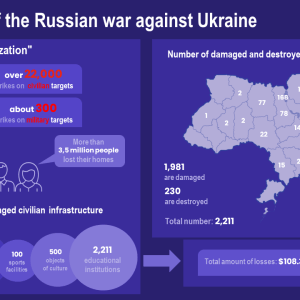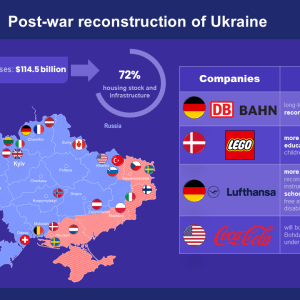218 KB
The situation with regard to the position of Asian countries in Russia’s war against Ukraine varies from outright condemnation to neutrality. According to the EIU, over the past year the number of Russia-leaning countries worldwide has increased from 29 to 35 (which is almost 33% of the world’s population).
Some countries that used to be West supporters, such as Turkey, have shifted to the neutral category as their governments seek economic benefits from engaging with both sides in this war.
The positions of Asian countries depend on their geopolitical interests, vision of security, both in the economic and political spheres, and geographical proximity to Russia. The closer the state is, the more urgent are the economic interests.

China
From the very beginning of Russia’s invasion of Ukraine on February 24, 2022, China has repeatedly emphasized who they believe is the real aggressor: the United States of America. From the official point of view, as well as from the point of view of the Chinese elite, Russia did not start a war of aggression. Instead, using Russian military language, Chinese state media are pushing a narrative of a “defensive offensive” against what Russia calls “NATO’s eastward expansion.”
North- east Asian democracies
Japan and South Korea condemned Russia’s invasion of Ukraine. This was fundamentally a values-driven decision. Both countries see themselves as part of a global alliance of democratic forces. At the same time, the security situation in the region strongly influences the perception of the war by political elites and people in both countries. On the one hand, there is a common fear of North Korea as an aggressive neighbor that is constantly working on its nuclear weapons and has repeatedly tested ballistic missiles. On the other hand, at least Japan has territorial conflicts with two major powers in the region, China and Russia, which carry the risk of escalation in a crisis situation. The attack on Ukraine actualizes these threat perceptions. Both countries also have quite intense economic ties with Russia. But despite sanctions energy imports remain high.
Vietnam
The case of Vietnam illustrates the geopolitical dilemma in which many Southeast Asian states are currently finding themselves. Russia is not only the most important arms supplier to Vietnam, but also a central strategic partner in the development of oil and gas fields in the South China Sea. Meanwhile, in its Indo-Pacific Strategy, the Biden administration in Washington has enshrined Vietnam as a priority security partner and is increasingly investing in economic and military ties, despite ideological differences. Both the United States and Russia play a key role in Vietnam’s ability to counter the growing threat to its security from Beijing. Since the outbreak of the war in Ukraine, Vietnam has been growing concerned that China’s approach to the conflict in the South China Sea, among other things, may focus even more on so-called “gray zone” tactics.
Thailand & Taiwan
The Thai authorities’ efforts to remain neutral were vividly illustrated by the silent removal of the head of the army’s Channel 5 TV channel, which had been presenting a strongly pro-Russian position and spreading disinformation in its programs until the end of March, when one of its broadcasts was suddenly interrupted and the army publicly apologized for “technical problems.” Similar to Myanmar, many members of the old elite in Thailand are behind Russia’s war of aggression, while younger pro-democracy activists have been sharply critical of Russian policies. In Taiwan, however, the war against Ukraine has heightened concerns about the Chinese People’s Liberation Army invading the island. As the course of the war in Ukraine continues to demonstrate the strengths of a motivated, technology-based defense strategy against a superior aggressor, it is forcing Taiwan to rethink its own defense concepts.
India’s response
Indian Foreign Minister S. Jaishankar said that India’s position on the situation in Ukraine is based on “an immediate end to violence and cessation of hostilities”, “a return to the path of dialogue and diplomacy and a global order based on international law, the UN Charter and respect for the territorial integrity and sovereignty of all states”. Jaishankar said that India’s foreign policy decisions on such issues will be made in accordance with national interests and guided by his country’s thinking, views and interests. India has consistently abstained from voting on UN Security Council and General Assembly resolutions condemning Moscow’s actions.
However, the EU and the US believe that India should take a tougher stance against the RF. The West is urging India to take a more “principled” stance against Russia and change its position at the UN and other multilateral forums, not to buy oil from Russia and even refrain from a rupee-ruble trade deal that could circumvent sanctions or support the Russian economy.
Despite Western pressure and India’s principled and growing proximity to the West, India’s response to the war in Ukraine is unlikely to change. This is due to complex and compelling geopolitical reasons as well as national interests at play: the country is more tied with Russia in terms of military cooperation, technology and energy resources.
Türkiye
Türkiye should be emphasized as a country that has decided to take a neutral position in this war. It is important for Türkiye to take two sides at the same time: supporting Ukraine and supplying the country with military and humanitarian aid to improve its relations with Europe and thus increase the country’s ability to obtain the coveted EU membership. At the same time, keeping silent on Russia allows Türkiye not to lose its finances by continuing trade and interstate relations with the aggressor country.
Alina Petrosian


